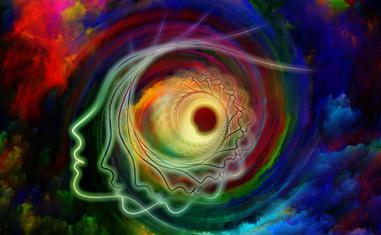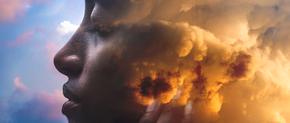The views expressed in our content reflect individual perspectives and do not represent the authoritative views of the Baha'i Faith.
A half-truth plagues the world, that we have five senses: our sight, smell, hearing, taste, and touch. Each of these are observational mechanisms, yet we are rarely taught about our two inner eyes.
Those inner senses – the eye of thought, or our intellectual eye; and the conscious awareness of all other senses, usually called our mind’s eye – combine to give us inner sight, that all-important faculty we know as insight.
The mind’s eye can be understood when we look at moments of intuition, of gut feeling, of sensing something isn’t right, that someone is being dishonest, or a company or government is lying.
RELATED: What Is Reality – and Can Our Senses Understand it?
It can be seen when we enter states of flow, when we are in complete unity of all our senses such as mountain climbing, downhill bike riding, or surfing. But this flow state doesn’t have to be elicited by high-risk sports – it can also be tapped into through creative pursuits such as writing, producing music, dancing, painting, drawing, problem solving, and helping others.
This creative state of flow forms a connection to the Creator, as the Baha’i teachings suggest. Abdu’l-Baha, in Some Answered Questions, said: “This connection between God and His creation is that of the originator and the originated, of the sun and the dark bodies of the universe, of the craftsman and his handiwork.”
All of us who live in the civilized world today have benefited from the flow and the wisdom of the ancient ones brought forth decade by decade, century by century, millennia by millennia through written expression. This accumulation of wisdom has allowed knowledge to build upon itself. As Isaac Newton noted, “If I have only seen further, it is by standing on the shoulders of giants.”
What Newton “saw” was not with his physical outward eye, but with his inner eye, his intellectual wisdom. In a time when an enormity of knowledge already existed in the world, his self-education and inspiration connected ideas, enabling him to see things the world had not yet been able to see. With that sharp insight, he brought forward new truths from the divine realm, truths that would allow future giants of science to come forward by standing on his shoulders.
We often take for granted the intellectual pursuits of humanity’s geniuses who have seen truth, perhaps best described by Newton when he said:
I do not know what I may appear to the world, but to myself I seem to have been only like a boy playing on the seashore and diverting myself in now and then finding a smoother pebble or a prettier shell than ordinary, whilst the great ocean of truth lay all undiscovered before me.
RELATED: Using Our Inner and Outer Senses
Newton, as with other geniuses like Socrates, Plato, and Aristotle, knew the limits of ignorance. They became the wisest of their age as they pushed at the edges of their knowledge as a daily practice. Not simply an intellectual pursuit, they explored through conversation, through experimentation, through investigation, through play with the material realm around them. Their observations, backed by a sharpened mind – that inner faculty Christ asked us all to develop – allowed them to dissect the material world, and through their relationship with God, bring forward new knowledge.
We have two inner eyes, though – the intellectual eye, and the experiential eye. Our oral cultures have carried their experiences forward with immensity, as well; through practice, language, dances, songs, food, plant medicine, and in many other ways – carefully tending to the land to reap the fruits provided for them. Without written expression, those Indigenous carriers of wisdom ensured that the truths revealed to them in the days of their ancestors were preserved for millennium.
The Aboriginal Australians, for example, carried for over 50,000 years the ancient wisdom of God. Their responsibility was to the land, to their ancestors, and to the Creator, who brought forward all existence and bestowed upon them the right and responsibility to take care of not only their land, but the experiential knowledge and wisdom that ensured the continuation of the practices necessary to their spiritual traditions.
In just one instance of that wisdom, the practice of ritualistic burning in Australia, which burns away the deadwood and allows for new growth, is necessary for the cyclical revival of the land, as a phoenix rising from the ashes. This practice, not limited to the land, is also symbolically necessary for ourselves as individuals, and for humanity.
RELATED: Using Your Spiritual Senses to Go Beyond the Literal
To allow our inner eyes to see, we can each use some burning away of the ego. Our egos, which stem from our awareness of self and the perceived accumulation of knowledge, can form the dark veils of storm clouds, keeping God’s light away from shining on the trees of our hearts. Inflated human egos increase our sense of self-importance, blinding us to the importance of others. The Guardian of the Baha’i Faith, Shoghi Effendi, wrote “Life is a constant struggle, not only against forces around us, but above all against our own ego.”
Without light, a tree cannot grow. The clouds of ego do not produce the living waters necessary to sustain us. Without light, our tree retreats to its absolute core, trying to maintain some modicum of the living waters left inside us. But when the fire has purged the dead wood of our ego, the rains do come, and the light does shine. Our souls are nourished by God’s living waters, giving rise to new life. The light provides energy and direction, ensuring that our souls move in the right direction, toward virtue, toward enlightenment, and toward spiritual growth.

















Comments
Sign in or create an account
Continue with Facebookor